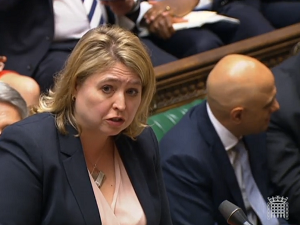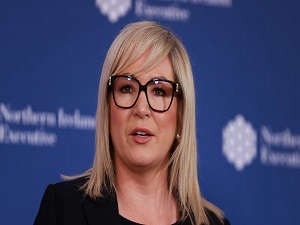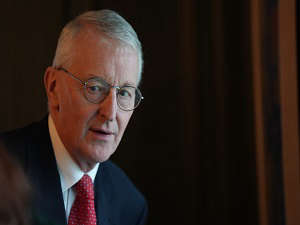
By Michael McHugh
The Northern Ireland Secretary has said she initially did not understand that the country's nationalists did not vote for unionist parties during elections.
Karen Bradley was appointed earlier this year and admitted at the time she did not comprehend that campaigns are generally fought within each part of the community rather than across it, as in her own parliamentary constituency.
She also said she did not fathom some of the deep-rooted issues which define Northern Irish politics.
She told The House magazine: "I didn't understand things like when elections are fought for example in Northern Ireland - people who are nationalists don't vote for unionist parties and vice-versa.
"So, the parties fight for election within their own community.
"Actually, the unionist parties fight the elections against each other in unionist communities and nationalists in nationalist communities."
Ms Bradley was appointed in January after her predecessor James Brokenshire stepped aside for medical reasons.
She continued: "That's a very different world from the world I came from, where in Staffordshire Moorlands I was fighting a Labour-held seat as a Conservative politician and I was trying to put forward why you would want to switch from voting Labour to voting Conservative.
"That is so incredibly different and it's when you realise that, and you see that, that you can then start to understand some of the things that the politicians say and some of the rhetoric."
She was interviewed by the weekly magazine for the Houses of Parliament.
Often the battle for seats at election time is between Sinn Fein and the Social Democratic and Labour Party (SDLP) or the Democratic Unionists, Ulster Unionists and smaller unionist parties.
The cross-community Alliance Party has made gains in some areas like Belfast in recent times.
It holds the balance of power between the two communities in Belfast City Council.
Former Ulster Unionist leader Mike Nesbitt stepped down following a disappointing 2017 Assembly election.
His call for unionist electors to support the SDLP in proportional representation elections and vice-versa as an alternative to the DUP or Sinn Fein backfired as a number of senior party figures lost their seats.
At the time he said: "I'm also the one who said this should be Northern Ireland's first post-sectarian election based on the economy and education and health and housing and that I had a different vision, but the electorate disagreed."


 O’Neill praises Pope’s commitment to peace as she confirms funeral attendance
O’Neill praises Pope’s commitment to peace as she confirms funeral attendance
 Woman suffers ‘traumatic ordeal’ in roadside robbery in Newry
Woman suffers ‘traumatic ordeal’ in roadside robbery in Newry
 Shock over record number of attacks on ambulance crew
Shock over record number of attacks on ambulance crew
 Police investigate petrol bomb attack at Co Antrim flat
Police investigate petrol bomb attack at Co Antrim flat
 Benn to discuss legacy issues with Harris at Hillsborough Castle
Benn to discuss legacy issues with Harris at Hillsborough Castle